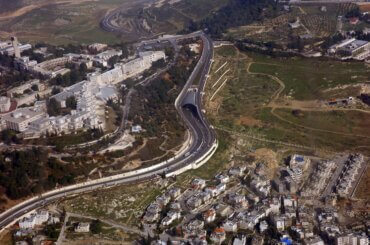This is part of Marc H. Ellis’s “Exile and the Prophetic” feature for Mondoweiss. To read the entire series visit the archive page.
Palestine is occupied by Israel. Al Aqsa is occupied by Israel. Can the churches in Jerusalem and throughout the land escape that same occupation?
Not in the least. And, thinking globally, at least with reference to Israel-Palestine, especially in the United States, the churches are also occupied. Mostly by their history and their limited ability to think Muslim. After a long tumultuous and annihilationist history toward Jews, it turns out that Christianity has become Jewishly identified. Which means tangled up in Israel.

Last Sunday, though, a sermon in Jerusalem promised a breakthrough. The sermon was preached by Rev. Páraic Réamonn from the Church of Scotland at St. Andrews.
It seems our good reverend has received quite an education since stepping off the plane at Ben Gurion airport two months ago.
Reverend Réamonn starts with his overall interpretation of the Gospel – God loves us. Then it’s on the Bible that has all sorts of views and trajectories other than love.
Here is Reverend Réamonn:
Our Bibles tell us that God loves us, but they also tell us things that are not so easily reconciled with this good news.
We say that scripture is the word of God, and so it is: a book, or rather a collection of books, in which God speaks to us. But like Jesus of Nazareth, it is the word of God in human form. And unlike Jesus of Nazareth, it is not without sin.
In my first service we read Psalm 149, which includes these words:
Let the faithful exult in glory;
let them sing for joy on their couches.
Let the high praises of God be in their throats
and two-edged swords in their hands,
to execute vengeance on the nations
and punishment on the peoples,
to bind their kings with fetters
and their nobles with chains of iron,
to execute on them the judgement decreed.
Decreed, that is, by God.A week after the shooting stopped in Gaza, it was hard to read these words. When two-edged swords translate as 32,000 artillery shells fired into one of the most crowded areas on God’s earth, when “vengeance on the nations” results in more than 2,000 dead, it is hard to hear this as good news.
Reverend Réamonn continues with reference to the Exodus story:
Traditionally, people have read the story of the exodus as good news: “We were Pharaoh’s slaves in Egypt, but the Lord brought us out of Egypt with a mighty hand.” (Deuteronomy 6.21) As Robert Allen Warrior notes, Jews in exile and then in the diaspora read this story and were reminded of God’s faithfulness. Black slaves in America, given Bibles to read by their owners, began at the beginning and found in the Pentateuch a God who was obviously on their side, even if that God was the God of their oppressors. Later, in the civil rights struggle, Martin Luther King went to the mountaintop, like Moses on Mount Nebo, and saw the promised land. And in the same decade, the struggles of Latin American communities for justice spawned a theology of liberation in which the story of the exodus was central. “The exodus, with its picture of a God who takes the side of the oppressed and powerless, has been a beacon of hope for many in despair.”
Read this story on Mount Nebo, read it on the east bank of the Jordan, and it is good news. But cross the Jordan with dry feet and enter the promised land, and it becomes a much more ambiguous tale. For the story of the exodus is also the story of the conquest – a story in which God drives out before the slaves liberated in Egypt the peoples who dwell in the land, a story, indeed, in which God commands these liberated slaves to exterminate the peoples who dwell in the land.
“When the Lord your God brings you into the land that you are about to enter and occupy, and he clears away many nations before you… and when the Lord your God gives them over to you and you defeat them, then you must utterly destroy them.” (Deuteronomy 7.1f)
Reverend Réamonn’s conclusion may seem obvious. Spoken in the center of Occupied Jerusalem it is explosive: “Ethnic cleansing is not good news. Genocide is not good news.”
Then an addendum:
Scholars try to smooth our ruffled feathers by telling us it didn’t happen like that – that this is not a story written by a triumphant Israel that has driven out and destroyed its enemies, that, on the contrary, the book of Joshua was put together when the leading families of Judah were in exile in Babyon or even later, when they returned to head up the small and insignificant Persian province of Yehud, that it is, in short, the book not of a triumphant people but of a defeated people.
But that doesn’t change the storyline.
And when this storyline is used in our day to vindicate the view that this land is a land promised to the Jews – that it is their divine calling to build here a Jewish state for a Jewish people, driving out before them the people who live here – then it becomes not good news but a text of terror.
Fortunately, Reverend Réamonn is an equal opportunity critic of Biblical texts. Well almost.
With a sense of Christian triumphalism shadowing almost every Christian sermon, there needs to be another addendum, Jesus’ cautionary note about dealing with one’s own sin before overcommitting to the sins of others. Matthew 7 does it succinctly: “Why do you see the speck in your neighbour’s eye, but do not notice the log in your own eye?” Reverend Réamonn adds: “For our Gospel reading is no better than our reading from what we call the Old Testament.”
So right! Especially if we see the New Testament as I do, stretching more or less the same number of years as the Hebrew Bible does. If so noted, the New Testament stretches from Jesus to Auschwitz. The difference is that while the history of the Hebrew Bible, including its violence, lacks historical verification, the history of Christianity is quite well documented.
The log in the Christian eye becomes larger, especially if we name the Gospels that are carried forth by Christians in the world. I think especially of the Gospel of Colonialism and the Gospel of Treblinka but there are many, many more.
Visualizing Christian history, think of the Christian Bible through illustrations. Start with the unusually handsome and white Jesus and end with Pope Benedict in his long flowing robes at Auschwitz. Pope Benedict himself a member of the Nazi Youth.
The sermon does go on and a variety of topics are covered, including the value added of the rabbis, the scourge of anti-Semitism and alike. However the kernel is already there – ethnic cleansing and genocide in the Hebrew Bible. In Israel today?
The closing is Reverend Réamonn’s weakest point. He does say that comparisons – whose log is bigger – don’t get us very far. But the call for prayer, perhaps appropriate in the church setting, is anti-climactic. Under occupation, prayer for one’s own sins and the sins of your community is a luxury. Such a ritual cleansing when repeated every Sunday often partakes of another sin – the sin of inaction. Confession can freeze Christians in their sins, historical and otherwise, rather than urging them to confront the sins of ethnic cleansing and genocide that are happening outside their wonderful church windows.
After Gaza and with Jerusalem reaching the boiling point as I write, prayer and introspection won’t do. But, then, if the churches throw off the occupation and are willing to pay the price perhaps others will follow.
Texts of terror, thought again and through. Is this the way through the impasse that threatens Jew and Palestinian alike?



more please, Reverend Réamonn.
would that your inspiration cross the seas to the ‘houses of worship’ on this side of the world.
I suppose that’s why I could never accept Christianity growing up.
For every nice idea that got repeated every Sunday in church, there were ten outrageous, ugly & murderous ideas that were in the Bible right next to them. It struck me as cherry-picking to only repeat the nice ones, so I decided that the notion of God had to be bigger than any Bible or any church. That text — both the good and the bad — was Man’s doing, that’s all.
I think the Reverend does well to point out that one group’s liberation is another group’s subjugation, especially as it applies to modern-day Israel. Too bad he’s unwilling to follow this line of thought to where it needs to go, past simple prayer to larger action, even if that action entails the rejection of Biblical veracity.
With a sense of Christian triumphalism shadowing almost every Christian sermon
“What’s Christian triumphalism?” The belief that Christ “triumphed” over death?
And why use a negative term like “shadowing?” Why not “shining”?
Reverend Réamonn adds: “For our Gospel reading is no better than our reading from what we call the Old Testament.” So right!
I tend to think that the New Testament is “better”. Ancient Israel believed that the Messiah would come. If the Messiah came and brought God’s grace directly to people, wouldn’t His book be in any way “better” than the books that preceded it? If the Messiah comes and does all kinds of amazing things, isn’t that “better” than what happened before?
I missed the “Gospel of Treblinka” in Sunday School, but then at Catholic Middle school we all took a half year course on the Holocaust and went to the Holocaust museum.
Historically (20th century) the Liberation ideas in South America got short shrift from the established Catholic Church. Presumably the trouble was that they were not satisfied with getting the poor into heaven but wanted to shake things up here on earth in a way which battered the privileged. The privileged weren’t having that.
The current essay announces the sin of inactivity as if in Christianity there were a mandate for activity. Christians have acted qua Christians over history, especially against heresy and other perceived threats to Christianity, as in the Crusades. But although Christians often act, they do so less often qua Christians. The holocaust may have been carried out by Christians (or nominal Christians, but who am I to get all picky?), but the holocaust was not carried out by Christians acting as such.
In Israel, Israel plays the role that the church and wealthy played in South America, the role of owner oppressor over the poor. The Palestinians play the role of the poor. The church (apart from people like MLK Jr.) aren’t much in the “active” game.
Turn the other cheek and render to Ceasar are Christian ideas which (in I/P) leave Israel in the driver’s seat.